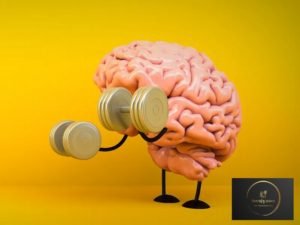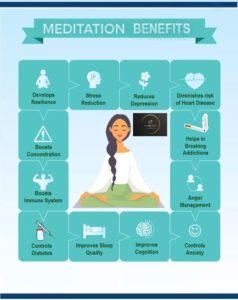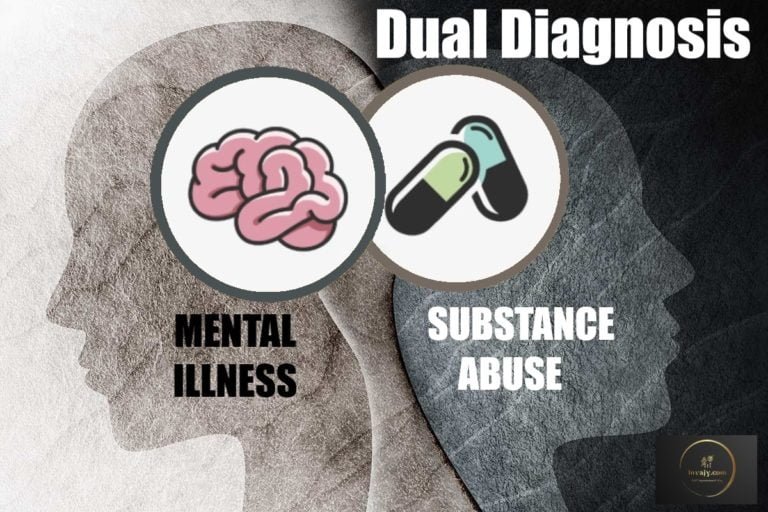How to Clear Brain Fog and Increase Mental Clarity?
Navigate through brain fog with practical tips and insights. Learn strategies to enhance mental clarity, boost focus, and regain cognitive sharpness for a productive day ahead.

Everyone now a day uses computers and smart phones. You will find that sometimes few programs run in the background and increase the load on the memory card. Due to this device gets hanged and it becomes difficult for them to work normal. Your brain also work in a similar way, ongoing anxiety and stress are those programs that run in the background and use up tons of memory and make everything else run slowly. You experience a cloudy-headed feeling and your mind gets stuck. This condition is often described as mental fog or brain fog. Everyone goes through these cycles that cause varying levels of mental clarity. In this article we will discuss about how to reduce brain fog and increase mental clarity.
What is Brain Fog?
Brain fog is a term that describes a state of mental confusion or lack of mental clarity. It’s not a medical condition itself, but a collection of symptoms that affect cognitive function, making it difficult to focus, think clearly, or remember things. If you’ve been feeling forgetful, mentally sluggish, or just not quite yourself, you might be experiencing brain fog. It’s a condition of deteriorating mental clarity that’s more common than you might think. It’s actually your brain’s way of telling you that something isn’t optimal. In simpler words Brain fog can be described as problems with focus, memory, logic, and problem solving. It affects your ability to think.
Symptoms of Brain Fog
Brain fog manifests in several ways, and its severity can vary from person to person. Common symptoms include:
- Difficulty concentrating or focusing
- Forgetfulness or memory problems
- Trouble bringing words to mind
- Mood changes, such as irritability or anxiety
- Brain “cloudiness” or a sense of mental heaviness
- Physical or mental exhaustion or low energy or fatigue
- Decreased cognitive performance (e.g., slower thinking or difficulty solving problems)
- Confusion
- Headaches
- Trouble putting thoughts together
- Lack of ideas
- Lack of motivation and interest in the things you’d usually do
- Rarely noticing your surroundings
- Being unable to retain your attention during conversations
- An inability to multitask
If you’re experiencing these symptoms regularly, it may be time to take a closer look at the potential causes and begin addressing them.

What Causes Brain Fog?
Brain fog can be caused by various factors, ranging from lifestyle habits to underlying health conditions. Understanding the root causes can help you address the issue more effectively. Some of the most common causes of brain fog include:
1. Poor Sleep Quality
Sleep is crucial for brain health. When you don’t get enough restorative sleep, it can lead to mental fatigue, impaired cognitive function, and difficulty concentrating.
2. Chronic Stress
High levels of stress can disrupt neurotransmitters in the brain, making it harder to focus and think clearly. Prolonged stress may lead to a more persistent feeling of brain fog.
3. Nutrient Deficiencies
A lack of essential nutrients, such as B vitamins, iron, and omega-3 fatty acids, can impair brain function and lead to mental sluggishness.
4. Hormonal Imbalances
Hormonal fluctuations, particularly in women during pregnancy, menopause, or due to thyroid issues, can contribute to feelings of brain fog.
5. Medical Conditions
Certain medical conditions such as autoimmune disorders, diabetes, fibromyalgia, and even depression can cause brain fog as a symptom.
6. Medications or Drug Use
Certain medications, including antidepressants, antihistamines, pain relievers, and even over-the-counter drugs, can lead to cognitive side effects like brain fog. Additionally, the use of recreational drugs or alcohol can have a lingering impact on brain function, often causing temporary mental sluggishness or more long-term cognitive issues if used excessively.
7. Chronic Fatigue Syndrome (CFS)
Chronic Fatigue Syndrome is a condition characterized by persistent, unexplained fatigue that doesn’t improve with rest. Many people with CFS experience brain fog as a significant symptom, making it hard to concentrate, think clearly, or remember things. If you have ongoing fatigue along with mental cloudiness, CFS could be a potential cause.
8. Electromagnetic Radiation
With the increasing use of electronic devices such as laptops, smartphones, and tablets, there is growing concern about the potential effects of electromagnetic radiation on the brain. Some studies suggest that prolonged exposure to EMF (electromagnetic fields) could disrupt sleep, hormone balance, and brain function, potentially leading to symptoms of brain fog. While research is still ongoing, limiting screen time and using technology mindfully may help alleviate symptoms for some individuals.
9. Age-Related Health Changes
As we age, changes in our brain and body can contribute to cognitive decline. Hormonal shifts, changes in blood flow, and a gradual decrease in neural connections can all play a role in the onset of brain fog. Older adults may find that their mental clarity diminishes with age, making it harder to focus, remember information, and stay mentally sharp.
How to Clear Brain Fog?
Brain fog can be frustrating, but relief is possible. Living with mental fog doesn’t have to become your new version of normal. Here are the tips and strategies on how to reduce brain fog and increase mental clarity.

Exercise Routine
Daily exercise can be extremely useful to reduce brain fog. Your mind and body go hand in hand. When your body is at rest, so is your mind. Getting active and moving body causes the brain to go into overdrive and release adrenalin into the blood. When adrenalin and energy are delivered to the brain, memory is typically enhanced. You can include a exercise session in your morning rituals.
Get More Sleep
Getting enough sleep is crucial in combatting brain fog, as it allows time for the brain to clean out toxins. It’s like having the streets cleaned at nighttime when there’s no traffic on them. Sleep deprivation drains your energy and your brain does not feel fresh. Successive nights with little or no sleep aggravate the brain fog.

Increase the quantity and enhance the quality of your sleep. Focus on going to bed early and maintaining a healthy sleep schedule. Ensure having at least 7 hours sleep a day. But aim for 8-9 hours when possible for optimal brain function.
Explore New Things
The brain can get trapped in a rut when there is nothing new happening. Try adding activities to your weekly schedule to freshen things up.
You may join hobby classes a club. Increase your social interactions and have more personal visits to friends and relatives. Try something creative like painting, writing, coloring, dancing, cooking, or baking. Anything outside of your daily routine will broaden your horizons and improve your mental wellness.
You may go for outings and even plan for vacations on hills. This will help you to defeat the brain fog and increase mental clarity.
Unplug
Reduce your screen time. Unplug and try to put your smart phone down for a few hours a day. Try to use laptops or computer for a lesser period of time. Doing this you will be reducing the exposure to electromagnetic radiation, which one of the cause of brain fog.
Not only this, your brain will also not get inundated with unnecessary information from the news, social media, and emails flooding your smartphone.
Cognitive Simulations
Try cognitive stimulations, like puzzles, mind games, interactive videos, crosswords, brain training apps, or learning a new language. These gonna help you to increase your mental clarity and help you reducing brain fog.

Diet changes
When you don’t eat enough healthy fats, the brain uses itself for fuel. To keep your brain healthy and to get rid of brain fog eat a diet high in monounsaturated fats, plant protein, whole grains, wild salmon, eggs, and grass-fed meat and fish.
Keep your alcohol and caffeine intake low. Drink plenty of water to keep your body and brain hydrated.
Take More Breaks
Brain fog is often a sign that you’re overwhelmed, exhausted, or stressed. It’s a little warning signal from your brain to slow down or take a break. If you’re working more than your fair share of hours; take a break. Taking regular breaks from whatever tasks could be causing exhaustion help you reducing the mental fatigue. Stepping away from a task and taking a break can substantially improve your performance, focus, and degree of self-control.
Please do not start browsing social media and using your smartphone in such breaks. During these breaks, you can try meditation, taking a power nap, calling a friend or family member, taking a short walk, doing something creative or going outdoors.
Avoid multitasking
Multitasking is one of the leading causes of brain fog or scrambled thinking. For a clearer mind, try focusing on one thing at a time. Multitasking can drain your energy and lower your productivity, especially if you’re trying to do two activities that require conscious thought. Instead, try focusing on one thing at a time.
Meditation
Meditation is one of the best strategy to reduce brain fog. Mindful Meditation helps to relax your mind and body. When you meditate, you calm the mind, and you slow down the perpetual cycle of thoughts that can make it difficult to see straight. Meditation also reduce the symptoms of stress, anxiety, and depression, which are three of the most common causes of brain fog and lack of mental clarity.

If these hacks aren’t helpful, then it’s best to speak with your doctor or healthcare professional.
When to See a Doctor About Brain Fog?
If brain fog is interfering with your daily life or becoming chronic, it may be time to consult a healthcare provider. A doctor can help determine if there’s an underlying condition, such as thyroid imbalances, hormonal changes, or autoimmune diseases, that could be contributing to your symptoms. They can also offer advice on managing brain fog based on your individual health needs.
That’s all from my side. I hope, you liked this article on mental health. Please share this on your favorite social media portals with your friends and relatives.
(Disclaimer: This article is for general information only. Before adopting preventive methods/measures/treatment, please seek medical advice)







Good info
Thanks Ashish ji for visiting our blog and appreciating the work.
Informative post✨